Jonathan Lenahan's Blog
May 19, 2016
Drake (The Burned Man): By Peter McLean
Life is good for Hieromancer (i.e., demon-wielding hitman) Don Drake. Except, no, it’s not really good. In fact, it’s gone from kind of bad to downright awful. We meet Drake in the middle of a seedy card game in an even seedier bar – one frequented by demons and humans alike. McLean does a bang-up job of outlining Drake’s personality within this opening chapter. Within those pages, we see Drake get absolutely hammered on a combination of free high-end whiskey followed by cheap dollar store liquor, chase his losses in a card game that he eventually loses to a high-ranking but business-minded demon, have a one-night stand with a suspiciously beautiful redhead, and meet the center of Drake’s power: a demon that goes by the title “The Burned Man.”
Don Drake is a bit of an all-around fuckup. He drinks too much (although, as pointed out in a flashback, doesn’t truck with drugs too often). Despite having worlds of talent at his fingertips, he doesn’t employ it properly, and instead relies too much on The Burned Man to do his work. The one steady influence in his life is an alchemist named Debbie who he cheats and steals from. Deep down, however, he still has a small desire to be good. To do good. That is his redeeming quality.
Plot-wise, the book can be summed up as thus: Drake gets in more trouble than he can handle and has to turn to others for help. Others, in this case, being of the demonic and spiritual sort. In doing so, he attracts the wrath of the Furies, not to mention a few other powers-that-be who will not be named for fear of giving too much away. He gets the shit kicked out of him in nearly every chapter, is usually one bad-tempered demon away from getting cratered in the ground, and tells enough lies to re-brick all of China’s Great Wall.
If you like your protagonists to wear capes and beat the snot out of their enemies with heroically flaming swords, Drake isn’t for you. If you have an aversion to foul language, Drake may not be your cup of tea. If sex scenes and the world’s most cynical view of life make you cringe, I’d suggest leaving Drake on the shelf.
But, if you’re like me, then all those things make the book even more tantalizing.
Talking strengths, the Drake’s biggest is probably McLean’s use of his characters. Drake, being the story’s protagonist, is very well-done. He manages to be likable while still being a nearly irredeemable bag of dogshit. Being a first-person tale, the bulk of the characterization focuses upon him, and the rest of the people take a hit for it, but not overly so. The Furies aren’t terribly well-drawn, but they don’t need to be as they’re just essentially faceless villains for the real plotline to speed along. Debbie (Drake’s more off-than-on girlfriend) is a fun sort, while Trixie, though not necessarily fully-drawn in this first book, was laid out for a lot of growth in the upcoming novels.
The violence was fun while never delving into the gratuitous, and the the curse words fell along the same lines. Obviously there, obviously purposely there, and equally obviously not going to disappear anytime soon. It comes with the territory.
Plot-wise, additional complexity might have helped. Most of the “twists” were either too predictable or too obvious. For instance, at the end of one chapter Drake picks up an amulet because it “might be useful”, then goes on to find its utility less than a page later. Reading it, I would have rather him just shoved it in his pocket and been out the door rather than taking the time to explain why he did it. Instances like that occur with too much regularity for me to pronounce the plot as anything more than acceptably interesting.
All in all, it reminds me (a lot) of Jim Butcher’s Dresden Series. You can interchange Dan Drake for Harry Dresden, The Burned Man for Bob the Skull, Debbie for Karrin and Trixie for Michael Carpenter, the differences being that Drake is the darker and more cynical of the two. And, in comparison to the series as a whole, Drake pales.
However, if you remember the early books of the Dresden Series, you’ll remember that it started off slow and has since become a blistering sort of popular. But it took until about the fifth or sixth book to hit that pace. Considering how successful Harry Dresden has been for him, I think it a compliment to say that Drake is about as readable and entertaining of the first book concerning Harry Dresden, Storm Front.
Do I think Mclean could improve? Yup.
Would I buy Drake again? Yup.
Will I read the next book in McLean’s series, due (according to Amazon) in November 2016? Yup.
Entertaining, outlandishly dark and cynical, this is not going to be a series for everyone, but for those of us who enjoy the bitter side of life, it is definitely a series destined for our bookshelves.
The post Drake (The Burned Man): By Peter McLean appeared first on Jonathan Lenahan.
April 14, 2016
Clash of the Cocktails
So something cool is happening tongiht, and if you’re A) a fan of cocktails, B) a fan of Louisiana or C) a fan of anything booze-related, then you should definitely go.
It’s Clash of the Cocktails! It’s in Broussard, which isn’t too far from Lafayette. You can click the link above orrrrrr I can give you the bulleted version of what’s going to take place.
Take five bartenders from local restaurants and bars and put them together. These are the event’s competitors.
They are each given a secret ingredient before each of the three rounds. Upon receiving it, they incorporate it into a new, delicious cocktail. The results are then disseminated to the audience, who tries and votes on their favorites. At the end of three rounds, the bartender with the most votes wins.
Boom. That’s really about it. Participation fees range from $64-$110 and that nets you fifteen cocktail samples (3 samples for 5 bartenders), 3 entire cocktails, and catered food. Which isn’t terrible for the price, nor is it super good, but the fact that you’re going to be around drinkers and good drinks makes it pretty worthwhile in my opinion. The tickets might be sold out already (they were last year a week in advance), but it’s still worth checking into.
Now, as far as the drinks or classification of the bartenders are concerned, I really can’t speak to them. These guys are supposed to be good, though, and the Lafayette area has some pretty decent bars, so I won’t be surprised if it turns out well. I am disappointed, however, that some of the bartenders I know personally will only be attending as part of the audience, not participators. Those guys would absolutely, no doubts in my mind, kill it. Le sigh.
You have to be 21 to enter (duh) and it’s a dressy affair, so make sure you look halfway decent and add another halfway to that before you walk through the doors or you’re going to look extremely out of place.
If you can’t hold your booze, well, maybe you can just stick to the samples and give you three full cocktails to someone who drinks like an adult (if you see me, for example).
AND, if you find a bartender there who made a drink that you LOVED, make sure to compliment them. Even better, make sure to visit their bar and throw them some lovely tips. They’ll appreciate both but probably the latter more so.
The post Clash of the Cocktails appeared first on Jonathan Lenahan.
April 12, 2016
Mega-Tippers Exist – You Just Don’t Know It
After an extended break, courtesy of working fifteen hours a day for seven days a week, I’ve decided to start making blog posts smaller and more easily digestible. That way, hopefully, I can post more often and more regularly. At least, that’s the plan.
Anyway, after an extended hiatus from Facebook, I decided to create a new profile today. I went through the normal routes, adding every possible human I’ve ever come in contact with, uploading pictures, filling out the necessary information, blah blah blah. Boring and not really worth talking about.
But you know that little sidebar on Facebook that posts news you might find interesting? I scrolled through it late last night after a visit to my favorite pub and something caught my eye. It was an article on Jim Carrey (who I thought might legitimately be a good person even before this) and a tip he left for a waitress in NYC. If you want to read the article, here it is.

I have two things to say about this.
In my estimation, people that tip generously are normally better people. I mean that in a very general sense, but I stand by it. I can pick good tippers out from a crowd before they’re handed the bill, very often by their personality.
Mega-tippers like Jim Carrey exist around the world, but especially in America.
I work in the service industry. That means every time I go out, I’m tipping 50%-200%, depending on who my bartender is/how great the service is/my mood/etc. And this is not uncommon. In fact, I might even be on the lower end of things if you took a survey. In this industry, it is entirely common for a group of bartenders/waiters to go out to eat, rack up a $300 bill, and leave a $300 tip. The problem is they’re not famous so you never hear about it.
I just thought it was interesting that the media would fawn over somebody for doing something that I literally see every night in New Orleans.
Anyway, congratulations on being a worthwhile human being, Jim. I guarantee you that girl will take care of you next time you visit her restaurant.
The post Mega-Tippers Exist – You Just Don’t Know It appeared first on Jonathan Lenahan.
March 21, 2016
Books Aren’t the Only Stories In Town
Work is slow. I’m sitting here, staring at my hands. Lines. So many lines. Palms are fascinating. My mind has time to mull over parts of my life. My love life or lack thereof. My writing. Gym stuff. Money stuff. Job stuff.
My reading habits. Or lack thereof.
When’s the last time I read a book? Been a while, if I’m being honest. Between working, writing, and the seven thousand other things I do to fill my time, reading has taken a backseat. And that’s disappointing. More so than anything that comes to mind, books made me who I am today.
Admittedly, this bothers me. Immensely. If I’m not much of a reader these days, what does that say about me as a writer? AM I going to lose my touch because of this? Am I going to slide down the hill of writing skill instead of scaling its slope?
I trace my palms. A couple comes in and gets a daiquiri. Vile things. Go back to pondering my dilemma.
Well, before I can find an answer, I have to figure out what a writer is. I suppose the definition is someone who writes. Pretty simple, but that doesn’t help me. So be more specific. What am I?
I’m an author. What’s the definition? It’s someone who writes literary pieces.
More specific. I’m a fiction author.
Further. Keep hammering away. I’m a fantasy author.
There. That’s helpful. To be a good fantasy author, I must know what makes a book be considered “fantasy.” It needs to have certain elements, certain themes are pretty common, and things of that nature. To get those things. I must read. Right?
So a fantasy author needs to be good at those things. But what’s the most important thing a fantasy author does?
He tells stories. Stories that are wild and imaginative, ripped straight from the void and thrown on paper. Stories that have magic or creatures and lies and love and death and politics and anything else you might imagine.
I must tell stories. The better I am at that, the better I am at what creating good books.
Do I need to read for that to work?
The answer, I think, is no.
Books contain stories. Duh. But don’t stories exist elsewhere? I devoured The Wire in the space of two weeks. Five seasons of phenomenal storytelling, the likes of which I’ve rarely seen. Same with Breaking Bad a few years ago. I’m currently watching Boardwalk Empire, and while it’s not perfect, it has a few stories in there that you would be an utter bore not to find interesting.
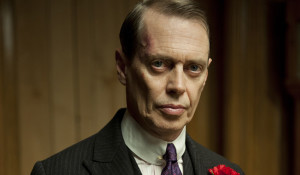
So stories exist in television format. What else?
I think of the people I know. I once worked with a fellow who’s greatest desire was to be a celebrity. A real one, the kind that gets invited to all the fancy shindigs and has his face plastered across every billboard. The kind who gets videoed at a basketball game for no apparent reason whatsoever and gets it posted online simply because he is who he is. But he can’t make it there because he has a pretty hardcore drug addiction. It’s sad. It’s also a helluva good story if you ever hear the tale get told.
What about architecture? The place I live in used to be a slave quarters back in the day. Then they turned it into a kitchen. The firehouse it’s connected to was built in the early 20th century, so even though there are garage doors, they aren’t big enough to admit a firetruck. Why? Because they were made for horse-drawn fire carriages. This place has a history. It has its stories.
Your family tree. The creation of a sandwich named after your favorite baseball player. An infamous political meltdown. The financial destruction of a company. The recovery of a terminal patient. The bird you saw in the park earlier. Whatever.
Each and everything around us has a story. And at its heart, writing novels around that simple skill: storytelling.
Yeah, we all need to read. Most of us probably need to read more, including myself. How else are you supposed to learn to manipulate the language, create beautiful scenes, authentic characters, twisty plot structures, and all that jazz? That’s what books are for. That’s what they teach us.
But if you can’t tell good stories, then the rest of it doesn’t matter. And stories are everywhere, we just have to pay attention.
So I’m going to finish this post up. I’m going to attempt to edit it before I hit that publish button in the morning. Then I’m going to read a chapter of the new Pierce Brown novel, Morning Star, which has thus far been terrific.
And before I go to Krav Maga tomorrow afternoon, I’m going to watch an episode of Boardwalk Empire. Because I’ll be damned if I miss the stories it tells.
The post Books Aren’t the Only Stories In Town appeared first on Jonathan Lenahan.
March 11, 2016
Molly’s at the Market
If there’s one thing New Orleans is known for, it’s bars. Heaps of them. Mountains of them, practically. All plying their trade in direct competition with one another, hoping they all make it out alive. Over the years, some fade, many burn, and a few special ones find success. But one in particular has withstood the ravages of time and come out better for it: Molly’s at the Market.
Known throughout the city as a hangout for local artists, journalists, and artists, I obviously had to see the place for myself. So Tuesday I stroll down Decatur, looking for the place. It’s relatively small and unobtrusive, only a plain sign hanging out front announcing its existence. That immediately makes me happy. That’s how all the best places are, right? Any place that has to advertise with gimmicks and crap usually doesn’t have anything worthwhile to back it up.
The bar is pretty dead, as expected. It’s a Tuesday, first of all, and the only people drinking are alcoholics and tourists. I can only lay claim to one of them. I have a notebook and pen in one hand, my wallet in the other. I can call this work, technically. Life is sweet.
I plunk myself down at the end of the bar on the second to last bar stool. It’s comfortable in an old-fashioned sort of way, which I adore. For what it’s worth, Molly’s is an Irish pub, and any pub that isn’t made almost entirely out of wood really isn’t a pub at all, and if it’s not a pub at all, then it’s not worth my time – at all (I love pubs). The bartender gives me the universal head nod that signifies she’ll be with me in a minute. I bide my time and start taking notes.
Tiffany shades cover the lights, giving the room an almost antique feel that does well to speak to the Catholic tradition of stained glass windows. I approve, mostly because it reminds me of my grandmother’s, which never fails to bring back the scent of delicious German-inspired cooking. Being a pub, Molly’s has a distinct connection with Catholicism, and a behemoth picture of a past Pope dominates the wall paneling near the door. I find this fascinating and immediately leap to study it. The lighting for the picture is absolutely horrific because of the glare of the sun, so my attempts to get a picture of it fail miserably.
In the back, there is this neat sign, another nod to the stained glass style of Catholic churches:

I return to my seat. The place has a bit of rebellion to it, but it’s subtle. Rather than screaming defiance in your face, it palms a sawed off shotgun and nudges you under the table with the barrel. There’s a bumper sticker on the wall reading, “Nola as F*ck* with a picture of someone’s face covering the “u.” Another New Orleans nod is found on a second bumper sticker, this one reading, “Make levees, not war,” which immediately makes sense to anyone who knows anything about the city.
Smack-dab in the middle of New Orleans, this is an Irish pub with American roots. Near the Pope’s picture, there is an American flag hanging from the ceiling. Across from that flag is the Irish flag. Then you have this sign nailed to the wall, the lobster being distinctly Louisianan and the Guinness being (ostensibly) Irish, which only further reinforces my point about the intertwining of the two cultures:
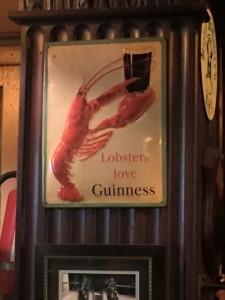
My eye eventually goes to, as it usually does, the liquor and beer selection. It’s not overwhelmingly impressive. Definitely more whiskey-centric, particularly the Irish, but nothing that makes me want to leap the bar and guzzle it from the neck. The bartender finishes helping her guest and promptly makes her way to me. She’s a blonde girl, tatted as tatted can be, and about as dry as dry can be but in the best of ways. Her name, I discover, is Rebecca, and while she knows enough about the history of Molly’s to help me out, it is observing her and her interactions with the bar guests that I really begin to get a feel for the place.
I order a simple cocktail to ward off the ravages of hunger and get back to work. In the middle of it, one of the world’s three most annoying souls manages to find me. In less than ten minutes, speaking in a drunken slur, the speaker informs me that his next tattoo – an overlord, humanoid bat that commands demons – will be wrapped around his forearm. Unprompted, he then delves into how he arrived at that idea, which apparently stems from his incredible powers of lucid dreaming. That somehow meanders into his career as a DJ and best beatboxer in New Orleans, finally ending with me getting clapped on the back and told that his family owns the biggest graveyard in New Orleans. He winks and weaves his way to the door.
I need another drink.
Rebecca comes over and I kindly request that she shoot me if that man ever came near me again. She nods seriously and says that the deed will be done. I ask her to tell me a little bit about the place, and like any good bartender, she launches into it:
“Jim Monaghan first started the bar back in 1974.” She points to a shelf above the cash register. “He passed away, but they keep his ashes in the urn right there.”
That’s a nice little nod toward the family. I take a picture of the urn, which ends up somehow being worse than my attempt to photograph the Pope. I hang my head in shame.
“His son, Jim Jr., runs the place now,” Rebecca said, doing her bartenderly duties. “He has two kids, Jim Trey (common for thrice named descendants) and Tierney. They’re the ones who run the bar now, and Jim Jr. just checks on them occasionally.”
I look around, noticing the plethora of police and firemen mementos. Pretty normal, as pubs go, but there are also a lot of military items strewn about the place. I ask her about those.
“Oh.” Rebecca looks up from the making of Molly’s specially brewed Irish Coffee. “Jim Sr. was former military. He always took care of people that came in here that were in the force. Kind of got a reputation for that, actually. It really helped the bar grow, back in his day.”
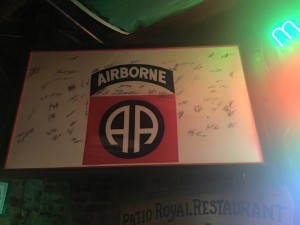 Found this in the corner.
Found this in the corner.“Usually,” Rebecca continued, making an emblem in the coffee’s whipped surface, “there are police and firemen badges lining the bar. Dead, retired, still on the force, whatever. Once a year, before the big parade, we take them down and run them through the wash. Get them cleaned up. That’s why you don’t see them up here right now. Some of the badges are older than me.”
For what it’s worth, Rebecca is almost thirty.
The bar starts getting busy, but Rebecca is kind enough to tell me that she gets off at 6:00, and that if I have anymore questions, I should stick around until then. Asking me to stay at a bar is like asking a dog if it wants a piece of steak. Just put it in front of me and avert your eyes so my slobber won’t embarrass you too terribly.
Thus far, Molly’s has been cool, but it hasn’t exactly lived up to what I was expecting. I order another drink, Guinness this go-round, and bide my time. Hip-deep in conversation with this fifty-five year old man who looked closer to the wrong side of thirty, I notice that 6:00 has arrived. It’s time to finish up my questions.
And this is where I think Molly’s true character begins to shine through.
Rebecca orders herself a beer and a shot – classic – and makes her way to the window. This isn’t just any window, though. It’s a huge cutout right next to the bar. Kind of looks like one of those places where you might walk up and order a sno-cone, or maybe an old-fashioned drive-thru. It looks directly into the bar, so if you’re on the outside of the window, you’re standing on Decatur Street. And when I say that it’s the perfect place for people watching, believe me.
I say as much to Rebecca, who lights up a cigarette. She smiles and taps the ashes on the ground. “Yeah, they call this window ‘The Best Television There Is.’ I prefer to just call it ‘The Window’, though.”
“Weird stuff happen around here pretty often?”
“Well,” she takes her shot, then chases it with a sip of her Miller High Life, “a couple weeks ago, on a Tuesday afternoon, this guy dressed as a clown – the shoes and all – ran past here with a boombox to his hear, thumping music and yelling ‘Be happy,’ over and over again.” She looks at me over the top of her High Life. “Weird enough?”
A man on a tricycle chooses that moment to peddle by me.
In the amount of time it takes for me to brush my teeth in the morning, Rebecca’s friend Katherine joins us. She runs a spa down the road, and she is Rebecca’s best friend. They get to talking about nothing, as best friends tend to do, and I’m interjecting occasionally. For some reason, it isn’t awkward. There’s a natural flow to it.
Rebecca asks me how I like “The Window.” I grin and say that it’s pretty cool. Definitely a place I would spend more time in the future. She nods. “That’s how this place is. Everything that ever happens, happens in front of this window.” She nods at an older man walking into the bar. He’s sporting a well-trimmed beard and glasses and wearing a long-sleeve collared shirt. Loafers and shorts. “See him?”
I nod. I could reach out and pat his shoulder if I wanted.
“That’s Bar Dad,” she said. “He was here the first day this bar opened, 21 years old and everything. He’s not a regular. He’s THE regular. Used to live upstairs, actually.”
“Why Bar Dad?” I ask. My hand is tired from writing so much.
“Because he has a family here. Watch, I’ll show you.”
I find the idea of someone going to the same bar for nearly his entire life fascinating. I ask how he feels about pictures. Rebecca scrunches her nose and says that he might be grumpy about it, depending on his mood. I tend toward safety and keep my phone in my pocket.
Another guy walks in. “That’s Creepy Bar Uncle.” This, she chooses not to give any information about, other than to say that he’s really nice. I get the idea that the nickname isn’t as insulting as it might appear. He is, it seems, part of the family.
In the space of the next hour or so, I’m introduced to a spate of other Molly’s regulars. There’s Bicycle Bobby, wearing dark clothes and drinking a tallboy PBR. Later, Rebecca tells me that people refer to him as “The Patron Saint of Decatur Street,” because he’s possibly the nicest person in the universe. “Bar Dad, though, prefers to call him the Dark Elf.” He is one of Bar Dad’s bar grandchildren.
Throughout the rest of the night, I meet bits and pieces of Molly’s family. In the process of it, I had a bunch of laughs, a bunch of drinks, and created a bunch of memories.
“Journalists and creative sorts meet there still,” Rebecca tells me. “But it’s only rarely planned, and even then it’s for a book reading or something along those lines. Mostly, it’s like this. People gathering who happen to have similar interests. I’ve only worked here for a year, but I’ve been drinking here for seven or eight. It’s the best bar in New Orleans.”
A few beers later, I find myself agreeing with her.
Molly’s at the Market isn’t special because of its drinks. While good, none of them are exquisite. It isn’t special because of its prices, though they are low. It’s not special for its decor or its history or anything else, despite what they might say about it online.
For this bar-goer, though, Molly’s is special for the people who go there. It is, as Rebecca pointed out, one big family, one that grows with each passing year. Before I left, I met one more guy. Turns out he won last year’s Rookie of the Year award, given by Molly’s at the Market. When I asked Rebecca what that meant, she said it was because he was one of the newcomers in 2015 who eventually became a regular before finally becoming, in a word, family.
And that’s pretty special.
The post Molly’s at the Market appeared first on Jonathan Lenahan.
March 7, 2016
An Interview With The Homeless Reader: Pope
New Orleans is a mess of a city – and I mean that in the best of ways. It’s unique in its character, certain to make an imprint on tourists and leave its mark on homegrown citizens, normally stamped in the outline of a beer insignia. Indeed, announcing a visit to New Orleans will incur a barrage of questions. Living there, one gets used to it. You reside in one of the most famous cities on earth, after all.
Right down the road from me is an exquisite steakhouse, the type of place that I eat at only rarely because it’s so cost-prohibitive. Mr. John’s, its called. And right down the road from it dwells another person, equally simple in name. He’s homeless, and his name is Pope.
He’s sitting there on an orange sleeping bag, clad in thick woolen black socks. His boots are stacked neatly to his right, well-worn and built for a life of tromping the streets. A crate rests in front of him, brimming with books. In his hands, a James Patterson novel. As I approach, walking my puppy, he reaches out to pet her.
“Good dog,” he says. “Sit.” Blue, as is her habit, refuses to listen, jumping up to lick him. “Siitttt.” He put out a steadying hand. “Pretty coat. They call that cinnamon or red?”
“Not a clue,” I say. “I just know she’s dappled. Patterson, huh? Standalone or co-authored?”
“Stand-alone.” He took a drag of his cigarette and told a couple good morning as they passed by. “I feel like he cheats whenever he writes with other people. Gets them to do the work and takes the credit.”
I tie Blue to a street sign and left her a dog treat. Thus began my interview with Pope, New Orleans’ literate homeless man. I arrange myself cross-legged in front of him and we start shooting the shit.
He looks to be in his mid-forties. Beard going grey. Glasses. I give him a John Grisham novel to read. My mom gave it to me a few days ago, and I read it last night, so I figured it was time to pass it on. He puts it in the crate with his other books.
We start out innocently enough, discussing – as you may expect – our favorite authors. He cites Grisham as one, Clancy another, W.E.B. Griffin for a third. Says the only book he’s ever read twice is a a novel titled Brules, by Harry B. Combs. It’s a sprawling, epic western, and we talk about that for a while. It’s something we have in common, as I grew up reading my dad’s Louis L’Amour novels.
I ask him why he doesn’t read books more than once. He takes off his glasses. He appears puzzled.
“Why should I?” he asks. “I read for entertainment. I read for the stories. And once I’ve found it, I pass it on for the next person to read.”
Blue, tied to the street post, whines, but a few scratches from a kindly stranger consoles her. Meanwhile, I found his point interesting. I, too, read for pleasure rather than some mystic or deep pursuit.
He continues speaking. There’s disdain evident in his voice. Why, I can’t exactly say, but I can’t bring myself to disagree. “I don’t read to gain stuff. Gain anything. Knowledge or any of that shit.” He takes a sip of his Pabst Blue Ribbon. “Don’t have any use for that. Just find a good story the best way of passing the day. Doesn’t mean I won’t read the classics, though. Read Tortilla Flat. I liked that, even if it was confusing as all get-out. Steinbeck, wasn’t it?”
“I think so,” I say. “So you don’t read poetry or most non-fiction books?” A general question from me, I know, but I wanted to hear more of his thoughts on the matter.
“I don’t feel like hanging out with a damn thesaurus all day.” He says good morning to another couple, this time a church-going duo, by all appearances. “If a biography has a good story, hell yeah I’ll read it. But if it’s just to talk about yourself or another person, then I’m not interested. Give me a good story any day.”
The day is beautiful. The people, even more so. Probably feeding off the weather. The sky couldn’t appear any more blue if it tried. It relaxes me, to the point that I stretch my legs. Study my worn-down, dog-chewed Converses.
“Where do you get you books?” I ask. There is a hole in the toe of my left shoe. A bit past their prime, I guess.
“Free libraries. That, and people like you just choose to give me books occasionally.”
“Free libraries?” I’m confused. I thought all libraries are free. “Whatcha mean?”
“Free libraries.” He polishes off the rest of his Pabst and spins the bottle idly in his hands. “There’s a couple within walking distance. One right down the street. Another one on Louisiana Avenue. You know, little shelves outside of houses. People put books there they want to get rid of, take books they want to read. Trade and flow.”
 So cool.
So cool.I find this concept fascinating and vow to take a turn down Louisiana Avenue soon. An ant crawls up my leg and I pinch in between my thumb and forefinger, wondering how best to approach the next subject.
A man with a to-go box brushes by us, giving me an opening. “So what do you do around here, mostly? Besides read?”
He shrugs. “Eat. Mostly leftovers from the steakhouse or whatever people bring me. If I have enough change, I’ll get a meal myself. I live well enough, all things considered.” His vocabulary is well-formed, if a bit rough, with the occasional misstep. Unsurprising considering his self-learned but relatively well-read approach to life.
We talk about food for a while. Lament people spending $45 for a $4 steak. Ordering $10 sides at a restaurant only to stab a bite or two from them before tossing them aside. We have similar views on this, I find. Eat until there is nothing left to eat. That’s how it works. Or how it should work. Anything else is nothing more than waste, a reminder that you have too much money to spend and should find somewhere else to spend it.
I promise him a Shiner Bock from my house. He accepts it with a grunt. That’s about all that’s in my fridge or I’d give him more.
“New Orleans native?” I did not think so. His voice did have that distinctive southern ring to it.
“Nah.” He shakes his head and flicks his cigarette into the street, lodging itself in a pile of other refuse. “Cincinnati. Grew up blue-collar. I had a good life, though. A real good life. Mom worked. Aunt worked. Grandmother was on welfare, but we all lived in her house. I worked, too. Since I was young. Had my first real job at fifteen, at Walgreens, stocking shelves. It was a good time.”
“Why’d you leave?” I itch to get the cigarette and put it in the trash. My inner-environmentalist speaking up.
“Marines.” He eyes me, as if I would not believe him. “Three years.”
“What happened?”
“Life’s a motherucker.” He smiled, showing off white teeth in a dark face. “Smoked too much pot.”
We share a laugh. Talk about the evolution of drugs in the United States. If and when Louisiana would ever shed its conservative view of the culture. A classic BMW passes us, 70’s model, and we spend a while talking about cars. Pope is a Cadillac man, it turns out. Had a roommate once, he tells me, that owned a ’76 Coup de Ville. Still his favorite driving car, to this day.
He says that this is his second trip to New Orleans. The first time, back after Katrina, he came here to help rebuild. Said the city ruined him. That he did not know when to leave the bar.
“It ate me up and spit me out.” He shook his head ruefully. “Worked, then worked at the bar. Drinking ’till I didn’t remember anymore. Went back to Cincinnati after that. Passed it doing odd jobs. Found my way back here.” He eyes me again, this time with a friendlier look on his face than the first time. “Tell you I tried walking here?”
“Bullshit,” I say immediately. The miles boggle my mind.
“Real talk.” He grins. “Look it up. Mywalktoneworleans.com. Made it as far as Tuscaloosa, writing about it and taking pictures as I went. Uploading everything at libraries. The Bible Belt, though, they stopped me.”
“What do you mean?” I shift, trying to make myself more comfortable. Young as I am, my knees do not do too well when they are crossed for too long.
He kept that grin on, but it was not that happy kind. Just seemed stuck there, kind of. “Black man, dirty as hell from the road, trying to get in the library? They weren’t having none of that.”
That type of racism strikes me as pathetic, but I grew up in the south. I know the truth behind those words. Not much I could do about it, though. And, being white as can be, there was no way I could truly empathize. Not authentically.
“I won’t be out here much longer, though.” He looks around, a man and what he looks at as his house, but not his home. “Veteran’s movement. They’re taking people like me and putting us up in apartments. Six months paid rent.”
“You excited?” I ask, then rapidly change that into, “What are you going to do?”
“Take some job-training classes.” He scratches his beard, grey creeping up his cheeks. “Program called Stride. They train us, brush up our resumes, get us ready to get back into the world.”
Time passes. I close my notes and we chit-chat about seemingly nothing. This homeless guy living next to a superb steakhouse, sprawled in the middle of the street, reading for a living and taking what life throws his way. It feels surreal.
I wrap it up with a promise to bring him the beers soon. Today, if I can. And print out this post so he has something extra to read. I make my way back home, Blue straining at the leash, and relax.
Books, it seems, touch more people than you know.
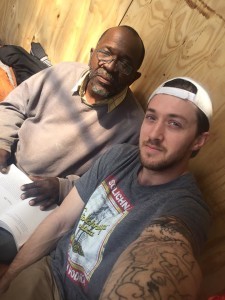 Pope and I.
Pope and I.*Note One: I went and read Pope’s blog. It was about what I expected. You know how some people are smart, but not necessarily educated? That’s him. I think sometimes people confuse the two. Yeah, his writing and musings aren’t going to win him a gold star in composition class, but there’s intelligence there. There’s a mind at work. And you can see it.*
*Note two: I got home about 5:15 A.M. after closing up the bar. Took Blue out for the first of her daily walks and saw Pope again, up and reading that new Grisham novel I gave him. Went home and got those Shiners I promised him earlier in the day. Left him there, leaning against the side of a building, drinking and reading. What can I say? When the man does it right, he does it right.”
The post An Interview With The Homeless Reader: Pope appeared first on Jonathan Lenahan.
March 4, 2016
Tourists Gone Crazy, the Bourbon Street Edition
Bourbon Street is home to a crazy variety of people. Street performers run amuck, amateur nudists, costumes galore – normally of the superhero variety – and more. You name it, Bourbon Street has it – or its tourists bring it. A few people earn their living on this street, including:
Naked people who pose with people for tips, both men and women
Two or three who consistently pose as human statues. One acts like Drew Brees throwing the football, another is an old man in a wheelchair with permanent double-barreled middle fingers stuck to the world.
A man and his dog, the latter of which plays “dead” like you wouldn’t believe, and whom I will be interviewing soon
Face-painters, many who choose to be topless so as to attract more customers
Bands, solo artists, and duets, playing anything from guitars to trombones, many singing at the top of their lungs
Tap dancers and rhythm artists, some of which are as young as seven or eight years old
And that’s just the people who make a living on Bourbon Street. That doesn’t include the barkers, bouncers, bartenders, bar managers, waiters and waitresses, barbacks, doormen, artists, musicians, and the other people who populate the shops and bars running along the street.
But we’re missing someone, eh? The tourist.
The tourist is someone, inevitably, from far away. They’re always Canadian or European or hail from some distant state. And they come in all forms, from kindly Germans who don’t know a tip from a hole in the ground, to reggae bands stopping by on their tour of the U.S. I’ve met more people while working on Bourbon than any other job I’ve had, and as entertaining as they can be, they can sometimes go horribly wrong.
Meet Austin, King of the Alcoholic Tourists and Emperor of Destroying Things Dear To Everyone.
He came in last week with his wife. Pleasant couple. The day was slow as hell, so contrary to my nature, I engaged them in conversation. Gotta’ make a buck, right? Turns out, they were a pretty funny couple.
It started off normally enough. I talked with them about their past, what they did for a living, etc. The stuff you talk about with people that you’ve never met before. Feeling them out.The husband’s name, as you know, was Austin (alias for the sake of his livelihood). He was a bar manager from the Tennessee region, in charge of one of the big restaurants you find scattered across the U.S. His wife, who we’ll call Erin, was with him for the ride. A nice little redheaded lady, she had the patience of a saint.
They didn’t appear to be hardcore drinkers. Austin started off with some Coors and she tackled a vodka something or another. They bought a round of shots and were nice enough to share a few with me, so the conversation started getting a little more lively.
We started talking about love. Erin was convinced that there was somewhere out there for me. I agreed – there is someone out there for me – but I wanted to play devil’s advocate. We got into it at that point.
“There’s someone out there for you,” Erin said. Her speech was delicate. I could barely hear her voice over the sound of the band. To salvage what remained of the conversation, I leaned in, at which point I caught sight of her husband.
And I didn’t say much the rest of the day. Just sat and watched.
He downed his pair of Coors within about three minutes flat. Ordered more with a casual tip of his finger. Downed the two of those within another five minutes. There was only one other couple at the bar, and he immediately made friends with them. Soon, the four of them were singing – if you want to call it that – in a tone fit for wounded hyenas. Austin had one arm around his wife, his other around this giant bear of a man, who in turn looked both confused and happy. His wife, an equally giant blonde woman, was guzzling a Hurricane.
The singing lasted long enough that my ears had begun to hurt, and Austin decided enough was enough. He hugged the couple individually and dragged his wife out of the bar, leaving the bar empty soon enough. I thought that was the last I saw of him.
He came back, announcing his arrival by falling flat on his face in front of the bar’s musician, a terrific singer by the name of Shelton. Made no difference to Austin, though. He bravely sauntered up tot eh bar and ordered another couple of Coors. I gave him a water and a thumbs up, which he returned with, for some reason, a wink.
From there, Austin took a rapid trip to Bourbon Street Hell, all of which he seemed to thoroughly enjoy.
It started innocently enough. He and his wife hooked up with the same couple from before. The woman started talking, the guys started drinking, and everything was going swimmingly.
Soon, though, I glanced over. I had a bottle of Tito’s in my hand, nearly wiped clean. Austin, it seemed, was gone. All that was left was the other couple and Austin’s wife, Erin. I asked where he had gone, but nobody knew.
One of the other waitresses walked in and asked me for a Bloody Mary. While I was making it for her, she told me a story.
“Jonathan,” Kristine said, a smile on her lips. “You won’t believe this. There’s this guy wondering around telling people he’ll buy them free drinks, and then running away. It’s hilarious.”
I looked up, a pepper shaker in hand. “Wouldn’t happen to be a redhead, would he?”
Her eyes widened. “Yeah!”
“Yeah.” I went back to the Bloody Mary, one of my favorite drinks. “Dude is drunker than shit. It’s pretty funny.”
Like a foghorn blowing in an empty night, I heard someone yell from the courtyard. “Hey, everyone, free drinks on me. Let’s go!” A pause as Kristine and I glanced at each other, then that same voice yelled, even more loudly, “Notttttt. Fuck you!”
In walked Austin back to my bar. Kristine and I just started laughing. She took the Bloody Mary back to her table, one of the lucky ones who Austin had just shouted at. Meanwhile, I greeted a few newcomers to the bar. Australians, young guys. They seemed nice enough, and they were drinking Blue Moons, so we could get along decently well.
About two minutes into the conversation, Austin stumbled over. He leered into the first Australian’s face, inches away, and proceeded to start mimicking him you did as a child when you wanted to be particularly insufferable.
First, he just repeated the Australian guy’s words. Then he started adding in the accent. And, dear god, it was awful. Sort of like this.
Except, if you really want to pinpoint it, you have to add in Austin’s drunken belligerence. At one point, he challenged the two of them to a fight. When they asked why, Austin just shrugged.
“Seems like the thing to do when you’re drunk.” He smiled winningly. “No hard feelings.”
Keep in mind that the two Australians hear could have whipped his ass a dozen times to Sunday. Austin seemed pretty good-natured about the entire thing.
Eventually, Austin calmed himself down. He bought the Australian guys a few rounds, guzzled some water, and disappeared onto the streets of Bourbon. Three women came in about five minutes later, complaining of some redheaded guy. I asked them what happened.
The blonde was drinking a vodka and Red Bull. “There’s this guy out there in the street, grabbing women’s asses.”
I choked on the sprite I had been sipping on. “Redhead?”
“Yeah.” The woman frowned. “Like, we were passing him on the street. Us three. And he just grabbed my ass. But when I turned and looked at him, he said he didn’t do it.”
“Sounds about right.”
“Yeah, but it wasn’t like we were at a club and I’m getting groped by every guy in the crowd,” the blonde continued. “It was me, my two friends, and him. And he still denied it. Idiot.”
At that point, Austin chose to walk back in. The women glanced at me, pointed at Austin, and immediately stormed out. Terrific.
He had calmed himself down, somewhat. That or the booze was slowly forcing himself to do it. His wife did not seem to care. She was having a grand ole’ time with the couple. Austin disappeared again, and this time I did not hear back from him until I heard another customer telling his friend that there was some guy passed out in the bathroom.
Austin reappeared once more and proceeded to vomit on the floor and drive people away. He tipped me handsomely, then left, never to be seen again.
I have my own reasoning for this, and I think it carries weight. We, as people, can’t act the fool in our own towns. Catch me rip-roaring drunk and an ounce of cocaine in my hip pocket in my hometown and – full-grown adult or not – my parents would have me locked in the basement.
But when you travel, you don’t know a damn soul. If you’re staying only a few days in teh city, then all the better. Who the hell is going to remember you acting like a complete moron?
In this case, no one. No one, at least, other than myself, the Internet, and Austin’s wife. The poor girl.
Just in case you were curious, here’s Austin in all of his glory. He returned here again later, wrapped around the toilet like he was cradling his only son.
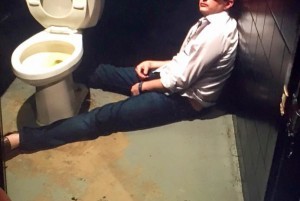
Jonathan
The post Tourists Gone Crazy, the Bourbon Street Edition appeared first on Jonathan Lenahan.
February 26, 2016
Tales of New Orleans: Hardware and Drunks
What does a hardware store, two drunks, and Dan Akroyd have in common? Turns out, quite a bit.
I grew up in a one red-light town village down south. My house had a big ole’ yard and oak trees. Cows grazed in the pasture behind my house. Probably about the most boring creatures in existence. Good for eating and little else. Definitely not cow tipping, by the way, unless you’re gullible or want a belly-full of horn. There was a pond, too. No fish, though. It mostly served as a sewer for the cows. I almost drowned in it one time. Dead of winter and I went through the ice. Came out covered in filth and shame.
Basically, my childhood and teenage years can be boiled down to one word: uneventful.
College gave my life some spice by necessity, as did teaching, but it wasn’t until I moved to New Orleans that the weird world of my imagination met reality. And never did I agree more with Mark Twain: truth is stranger than fiction.
So allow me to tell you a little story from my day’s adventures. It involves, as does seemingly everything, alcohol.
New Orleans is like a more chill version of Las Vegas in that pretty much anything goes, especially if you’re on Bourbon. Basically every tourist and their stepmom coming through my bar tells me that. And since New Orleans has more people visiting it than the average piece of rotten fruit has flies, I hear that daily. It’s enough to make my ears bleed.
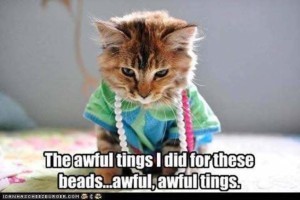
One way New Orleans stands out, though – and this is a big one – is its drinking laws. Specifically, wonders among Bloody Mary drenched wonders, is that in New Orleans, you can drink on the street, provided it’s not in a glass. When people ask me that, they do so nearly universally with eyebrows raised.
“Drink in the street?” they say, followed by a disbelieving chuckle and a rueful shake of the head. “You Americans must be mad.” (That’s actually a direct quote from a guy who came through one day wearing a rather beautiful purple hat).
That concept out of the way, let’s move to the meat of the story. I found myself walking to a certain unnamed hardware store today. I was in need of a pair of bolt cutters, a tool big enough to double as a murder weapon if anyone decided to try and jam me up while walking through the streets. When I got in the parking lot, I noticed two guys leaning against their truck, shotgunning the rest of their respective beers. They had the veiny forearms and paunchy bellies of longtime construction workers.
Nothing unusual about that. It’s 2:30 in the afternoon on a Thursday in New Orleans. What else would you be doing other than guzzling beers in the parking lot of a hardware store?
Thanks to my dazzling sense of direction, I got lost in within approximately three seconds of walking through the sliding doors . Somehow ended up in an aisle with a bunch of doorknobs before I found my way to the tool rental area.
Here’s where the story starts to get interesting.
I walked in and immediately found a way to make myself irritating. There was a laser running from one end of the door to the other. When you stepped through it, a signal bounced to the room’s other end and a beeping like hell’s own fire alarm sounded. Obviously, this was to make sure that the employees were paying attention to customers entering their section of the store. I, however, had my headphones in and didn’t know any better, so I just stood there for a goodly while until one of the employees kindly slid his finger across his throat and gestured me forward.
Instantly, I was enemy number one. But not for long. One old man proceeded to copy me for a wanton desire to burn the world. No way he had not seen and heard my gaffe twenty seconds beforehand. I attempted a high five but was pointedly ignored. I went back to my headphones. Fuck him.
There was a bit of a line in front of me. Everyone had paint on their shirts and looked like manly men, the types right at home in a hardware store. I had on a bright pink shirt and Converses with holes in the toes. Out of place, my specialty. The two alcoholics from earlier were in the line next to me, returning one of their tools. Some kind of paint mixing thingamjig. Soon, I began to hear them through my music, so I turned it off and tuned in to eavesdrop – if you can count listening to shouting as eavesdropping.
One of the men was bigger, the type I would corral into lifting the heavy end of the fridge when moving into a new home. He was doing most of the talking. And arm waving. And spitting. Lots of spitting. All aimed at one of the hardware store’s managers who looked like Dan Akroyd, he of SNL fame and Tommy Boy. The second of the alcoholic duo mostly just scurried beneath his friend and Dan Akroyd, like a a rat trapped in a box. One that has lost its teeth to gingivitis and can’t gnaw its way free. I’ll call him Bubbles. Pretty awkward scene.
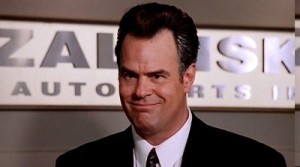
“I sure as fuck ain’t paying three days for that thing. It doesn’t even work!” The big guy, whom I shall name Gus, had a wonderfully diverse vocabulary.
“How long did you have it for?” Dan had hair like a balding porcupine. At this point, I didn’t care whether or not I got my bolt cutters now or in an hour. This was good entertainment, so I leaned against the wall and watched. The old man behind me left in a huff. Spoilsport.
“Three days,” Gus said. “But I only used it for two.”
“But you’re going to pay for three.” Dan was being patient at this point, I thought. Cooly professional. “We rent our tools out based on the amount of days customers keep them. You had it three days. You owe it to us for three days.”
“I ain’t paying three! I’ll pay for two,” Gus said. Had there been anymore menace in his tone, I would have been slightly nervous about where he was standing – right next to a mess of murder-worthy bunch of hammers and the like. A lot easier to swing those than a lawnmower, which Dan happened to have near him.
Apparently Dan had the same thoughts. “Call security.” He twirled a finger at one of his employees, who picked up a phone. At this point, Gus decided that enough was enough. He started screaming at the top of his lungs about the cloud of bullshit surrounding him, and how the management was out to get him, Dan most of all. Literally screaming. He gathered quite a crowd, which managed to block him from my view until I elbowed my way back to the front of the line.
I should add that the stench of alcohol was nearly enough to put down a draft horse.
“This fucking thing didn’t even work!” Gus picked up the hose of the tool he had rented and threw it across the room. Dan, to his credit, did not hit the man with a lawnmower. He simply started chewing on his cheek so furiously that I’m led to believe he now has a gaping hole in there to explain to his wife.
Bubbles popped a beer.
Shit you not. Middle of this calamity, the son of a bitch opens up a beer. I want to say it was a PBR, but that’s South Park’s undue influence swaying my hand. And he doesn’t sip it calmly, like a spectator eating popcorn. Nah, that’s not good enough for Bubbles. He smoked that beer and crushed it back beneath his jacket. All the while, Dan and Gus continued butting heads. No one other than myself and a few of the crowd even paid attention to little Bubbles.
The fight continued for another couple of minutes, complete with threats and security showing up. Eventually, I grew weary of the scene and just wished I could rent my bolt cutters and be gone. Long story short, one of the other managers came down and managed to calm down good ole’ Gus. From the time I walked in, here were the problems:
He wanted to pay for two days but actually owed three.
Equipment was missing from the tool, which meant he hadn’t returned it as he had rented it.
It was dirty as hell and filled with paint.
Of course, American consumerism being the most important part of our lives, the manager bent the rules and let Gus get away with two days and waved the cleaning fee. Bubbles, by the way, smashed another beer in the corner of the room while they continued their dickering.
Lesson learned: if you’re not right, scream. If you’re still not right, scream louder.
On the way out, bolt cutters on my shoulder, I saw Gus and Bubbles sitting on the tailgate of their truck, popping open a few more beers. Good ole’ New Orleans.
God forbid this city rethink their open container laws. Half the city would lose their minds, including myself. Walking Blue with a cold one in hand is one of my favorite pastimes. But that doesn’t help the poor hardware workers and Dan Akroyd. Have one tonight on me, guys. Cheers.

The post Tales of New Orleans: Hardware and Drunks appeared first on Jonathan Lenahan.
February 22, 2016
Lies and Allies: The Decision
We all have our favorite shows. Mine happen to be, in no definitive order, Archer, Rick and Morty, Breaking Bad, and The Wire. South Park on a good day. However, I watch more than just my favorites. Otherwise, how would I ever discover the new ones being produced? American Dad is one such show, and though it is not among my favorites, it occupies a strong second tier.
Whether it be Stan’s cartoonishly conservative ideologies – which are terrifyingly close to some actual living people’s – or Steve’s borderline unwatchable teenage angst scenes, American Dad consistently brought a smile to my face. Family Guy fell off after the first couple of seasons, and we’re not even going to address the abortion that was The Cleveland Show.
Roger, though, represented the best of the best that American Dad could offer. Egotistical, utterly self-absorbed, amoral, and sociopathic, Roger was great. HIs costumes and characters kept the show running when it should have been taken off the air years ago. And, to this day, still do.
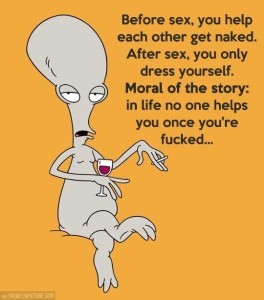
One episode always comes to mind when I think about American Dad. For all the years he stays on Earth, Roger thinks – nay, knows – that he is The Decider. In his mind, Roger is only on Earth to determine the fate of the human species. They live and die on his word.
His world, not to mention his self-confidence, crashes when Roger realizes that he was only on Earth because his own species couldn’t stand him. He was essentially a prom-night dumpster baby. This idea, this conviction that he was important was removed from beneath him like the figurative rug. And with his loss of “The Decision,” Roger becomes lost. The rest of the episode is spent repairing his confidence and giving him decision making capabilities again, which leads to all sorts of crazy shit. But that’s another story. Here’s the clip if you’re interested.
That’s how I felt when “deciding” to produce Lies and Allies. I regarded it as my “Decision.” It was a big deal to me, but what about other people? In case some of you guys are interested or wondering or just downright aggravated with me for pushing the second book back, I’m going to explain my reasoning for the rewrite and the trilogy’s bump to the Adult Fantasy market (leaving YA) – separated by neat little bullet points for the OCD among us.
Grammar and Sentence Construction:
If you know much about book publishing, you know good and damn well that it’s a team project. No matter how talented the author, he needs a content editor. And no matter how good the two of them are, they need a copyeditor. And regardless of that trio’s talent, they need a proofreader. Etc.
For Lies and Allies, I saved up and ensured I had the best team I could afford. Thus, the ideas, metaphors, analogies, sentence construction, and overall grammar are worlds better than what is displayed within Fallen Victors. This seems like a small point, but a simple comma is the difference between saying what you mean and becoming an Internet Meme.
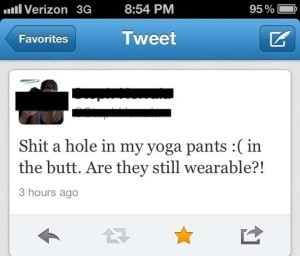
Plot:
It took me until the end of the first draft of book two before I realized that I had a problem. And not a little problem. Not one of those things you can switch with a sentence chance or a change of viewpoint. No, this was one of those problems so colossal that you toss your laptop into the sewer. The kind of problem where you just want to give up and say to hell with it all. The kind of problem that would change getting hit by a bus from a tragedy to a relief because at least you don’t have to deal with it any longer.
I begged with this draft. Pleaded. Offered bribes in bloody hands. Slid money under its doorstep. Took its puppy for walks. Whatever I could do.
Nothing. My life on the line, I could not get the second book to line up with the first. Not in a way that did the trilogy justice.
I was a rookie when I wrote Fallen Victors. Hell, I still am, but I’m at least a sophomore now instead of a freshman. Fallen Victors had holes and suffered from the fact that I didn’t plan it in accordance with its follow-ups. Instead, I wrote it like I would a standalone novel, then tried basing books two and three off it.
Which did not work. At all.
Eventually, after a tantrum that would have made Angelica from Rugrats proud, I decided that the only way I could get the plot to line up was to rewrite the first book.
As you probably know, that made me deeply, Camus-istically unhappy. But if I wanted the trilogy to be a success – in my mind, not including number of copies sold or whatever metric others measure success with – then I needed to rewrite Fallen Victors. Thus, Lies and Allies was born. And with that reversal, confusion was lifted and clarity restored for the following books. You know, if I do my job properly.
Violence:
No one has ever described my writing – nor, particularly, me – as being cuddly and soft. Violence is a part of life, whether it be in view or hidden behind curtains. Accordingly, I write along that philosophy. That isn’t to say that Lies and Allies is stock-full of nothing but blood and guts and beheadings and the like. It isn’t.
But when it’s called for, the book doesn’t shy away from the spectacle. Indeed, one of the main characters – Slate – is a mercenary. Violence doesn’t bother him overly much. Additionally, Alocar is a retired general, equally used to bloodletting on a large level.
To shy away from depicting that, so long as it was organic, would be a disservice to the trilogy. If the characters did as was natural, then the YA level would force me to write them with restrictions. In essence, I was putting on artificial limit on my characters due to the age limit and maturity of its audience.
That fault can be directly traced to me. Obviously, there are tons of YA books out there with fascinating characters. Had I recognized from the get-go that my characters belonged in the Adult Fantasy genre, this would not have been an issue. I didn’t, though, which meant I could either limit my characters, giving them a ring of inauthenticity, or I could bump it up a more mature genre.
Again, I went with the latter choice. Now, if Slate needs to put a knife through someone’s face, he can do it, no questions asked. If i had left Lies and Allies as a YA book, I would have had to tell the reader about that scene, not show it.
Here is a review for Fallen Victors that focused specifically on the level of violence on display:
I thought that a YA rating was for teens. This book was chosen by our teen book club mainly because of where the author is from and because of it being rated young adult. Mr. Lengthen is a gifted author and I am sure we will be hearing more from him in the future even beyond this trilogy. In recent years books for teens have become darker more violent, filled with what could be considered bad language and disregard for human life. This novel is like that. At times it felt a little disjointed like some of the information that would be helpful to the storyline was left inside the author’s head. I have already recommended this book to some adults that I think will like it. As moderator for the teen book club I felt compelled to give a heads up to the parents about content. Ultimately parents are responsible for what their children read. Some teens are mature enough to read this type of book others are not. As long as YA books are considered appropriate for teens I would prefer that books like this be rated for adults. PLEASE PARENTS, BE AWARE OF WHAT YOUR CHILDREN ARE READING
Parents are protective. I understand that. Stephen King was my favorite author in fourth grade, so I guess I was a little different than most kids. But with that review corroborating my feelings that my writing was probably more well-suited for adults, it was another nail in my brief YA career.
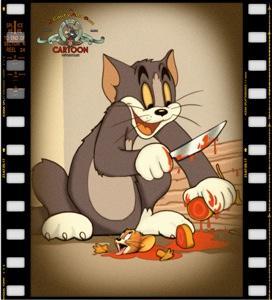
Length:
Fallen Victors was 89,000 words and some change at its debut.
When I finished the first draft of Called to Thrall, it was sitting at a solid 192,000 words.
Nowhere in this world will you find a book – no matter the genre – that literally doubles itself from one book to the next. Most Adult Fantasy books fall comfortably above 150,000 words.
If I wanted to keep Called to Thrall anywhere close to its predecessor, I would either have to drastically cut it or make it into two separate books, the latter choice creating a series of four where a trilogy once preened.
Rather than being a deciding factor in my decision to rewrite Fallen Victors, this was just the straw that broke that poor camel’s back. I plan on the second book in the trilogy to be anywhere between 145-170,000 words. Still a goodly jump from the 111,000 of Lies and Allies, but a far cry from the original 89,000.
Language:
If you read the review above or are even passingly familiar with my real persona, you know I curse. A lot. Call it a vice if you will. I prefer to think of it as realistic. Even the whitest unicorn in the land has an F-bomb fall out of his mouth occasionally, so don’t expect me to twist the language into something “acceptable” for others.
It’s weird. People have a tendency to forget what life was like growing up. They cursed like sailors just hitting dock as teenagers, but those same people, once they’ve grown up, gasp and grow wide-eyed at the thought of younglings cursing.
So, to me, if a mercenary says “Fuck,” then he’s probably just being authentic to his person. Of course, there are exceptions, but military people usually don’t have the cleanest mouths. I write accordingly
Personally, I think anyone should be allowed to read anything. Period. I was reading “Adult” contented book by second or third grade. Knowledge doesn’t come with an age limit. However, I also realize that I’m bucking the trend with that viewpoint. Thus, if I want my books to appeal to the “proper” audience, I need to take the language into consideration when designating the genre. And, the fact is, most YA books don’t curse as freely as my characters tend to do.
And, again, this is solely on my shoulders. If I bumped Lies and Allies up to an adult designation, though, the conflict resolved itself. Easy choice, all things considered. Another reason to leave YA behind.
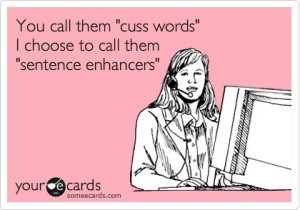
Depth:
This one is more difficult to explain. I’ll try my damnedest, but it may be like a fish trying to flop its way across the Sahara.
At twenty-six years old, I understand a whole helluva lot more than I did at fifteen. And that’s not because I was dumb – no more dumb than any other teenager – but it was because immediate understanding isn’t how life works.
So when I watched A Beautiful Mind at fifteen, I thought it was a cool movie. But when I watched it at twenty-three, I understood it in ways that I could not have comprehended during my first encounter.
Roll with me here. What do authors want? Different things, I’m sure. Some want money. Others want to be great. A few enjoy writing beautiful scenes and some like creating a book’s gorgeous scenery.
Me? I love characters. I want to create people so deep you can drown in the motherfuckers. Of course, I want to excel at the other things as well. The plotline, structure, climaxes, fight scenes. Everything. But if I had to choose the first among equals, it would be characters.
And, maybe this is just me, but I feel like that’s one quality YA cannot quite overcome with regard to Adult books. And it doesn’t necessarily need to. Or should even try. Can a sixteen year old appreciate the same depth of character a fifty year old can? Probably not. A parable read from the Bible holds more significance for a Bishop than an altar server. A younger person’s ability to understand and interpret things just isn’t on the same level as an older person’s with more experience. That goes for all of us. For more proof, I wish you could be there to witness my decade-separated reactions to A Beautiful Mind.
This acknowledgment pushed me to leave the YA genre. I want to create characters that can be fully appreciated. This works both ways,though. If I end up creating cardboard characters, the Adult readers are going to crucify me. There is definitely more leeway in the YA genre. But that’s a risk I was willing to take. And a goal I was willing to strive for.
Verdict:
When April 1st ticks around and Lies and Allies is released, I will have officially joined the Adult Fantasy market and left the YA genre behind. This route is rife with dangers. For one, no matter my desires or work ethic, I’m still a newbie in this game. If I screw up badly enough in the Adult market, I may never get another chance to climb the ranks. If I had stayed in YA, though, that danger would not have been nearly as significant.
Plus, the Adult market is harder to break into. I can’t tell you how many times people told me that in an effort to make me change me mind. Or play devil’s advocate. Adult readers like who they like, and anyone new is unexpected. YA, conversely, blazes through authors like Andre the Giant guzzles beers. It’s way easier to catch fire and become mega-popular in the YA genre than it is in the Adult world.
There’s a bunch of other shit I could throw your way, but for now, I think this will do. Lies and Allies was not the only way to go, but it made the most sense. I hope the rewrite was worth it.
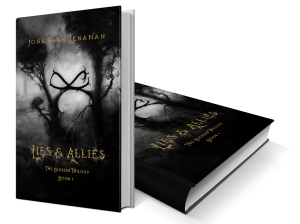
Jonathan
The post Lies and Allies: The Decision appeared first on Jonathan Lenahan.
February 18, 2016
Lies and Allies: Book One of the Blessed Trilogy
As of today, people, Lies and Allies is ready for pre-order, plus the accompanying swag items. That phrase makes me think about Chris Farley for whatever reason. Which, in turn, makes me think of Beverly Hills Ninja. And that, consequently, just makes me sad, so let’s slap on our Vermin Supreme inspired boot hats and talk about Lies and Allies.
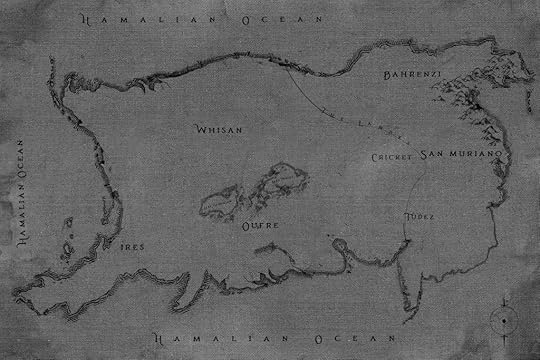
I’ve been away for a few weeks, though not by choice. Getting back online took FOREVER. The first guy we hired had personal issues within his family, which meant he couldn’t finish the project as promised. The second guy, though, ended up being a blast to work with, and I found someone to keep on board long term, so it came out as a win-win.
Long story short, ta-daaaaa. You’re looking at a newly redesigned website, complete with all kinds of fun knick-knacks. So, with that out of the way, let’s get down to the brass tacks.
Side note: I just spent fifteen minutes or thereabout researching the origin of the idiom “brass tacks.” If you’re as ADD as I am, this is the link.
In the last three weeks, I went through Bourbon Street Hell, complete with a red-horned Billy Bob Thorton strolling the sidelines, twirling his mustache. I could probably create a blog solely on the debaucheries I saw and sometimes participated in, but that’s a topic for another day.
More importantly (I think), I’ve been getting some book stuff out of the way. Sitting next to me, stacked next to the stove – probably not the best place, but whatever – I have a nearly-literal ton of coffee mugs, art prints, bookmarks, and postcards. Lies and Allies is a month and a half from becoming a reality, so now is the time to catch you up.
Storytime:
A little over a year ago, I released the YA fantasy book Fallen Victors. At the time, I was happy with it. I thought it was an enjoyable read with some problems, and the reviews on Amazon and Goodreads validated that thought. However, since I really want to do this writing thing for the long-term, I decided that my best option would be to break into the Adult Fantasy World.
Thing is, Adult Fantasy is a tough nut. Fans already have their chosen favorites, and it takes forever to win them over. While you’re trying your best to batten down their walls, they’re intent on tearing you apart. To really succeed in Adult Fantasy, you need better than a good read. You need excellence. And not only excellence, but continued excellence, which starts with a strong foundation.
If you don’t know, I’m an indie author. I pay for everything myself. And, straight up, I didn’t have enough money to do everything I wanted to Fallen Victors the first time around. Consequently, the bookk had its flaws, no denying it. Is that an excuse? Maybe. But it’s the truth.
So I had two choices:
Finish the trilogy as YA and attempt to ride the wave.
Take the book, revamp it the best I could, and re-release it as an Adult Fantasy novel.
I, obviously, went with the second option.
Why? Because, simply, Fallen Victors wouldn’t cut it in the Adult Fantasy genre. Its weak points were too glaring, it was in need of a good copyedit or two, not to mention a proofreading polish, and there were plot holes that, while I could get away with them in YA, would get blasted in a more demanding genre. In short, it needed an overhaul.
So that’s what I did. I kept my original content editor, hired a new cover designer and a copyeditor, along with a third-party consultant for genre-specific details, and we went back to the drawing board. Below is what we produced.
Lies and Allies Synopsis:
Prolifia is restless. With its military disbanded, mercenaries are the only thing standing between the Kingdom and its expanding neighbors. Civilians whisper words of rebellion, and cities are no longer considered safe. As the taxes rise to meet the Crown’s demand, the peoples’ faith in their rulers falters, leaving the King and Queen vulnerable to attack.
Moved to action by a masked figure with promises of love and power, an unlikely band of misfits is gathered. A former general, who desires not only to protect the people he cares for but the kingdom itself. A disgraced Priestess, who rose from the streets and attempts to grasp power over her life at any opportunity. A mercenary, who desires the return of a much beloved friend. And a prisoner, a Blessed, who wishes only for freedom.
Their task? To kill the King and Queen, making way for the Prince to take the throne.
With the Queen’s spies at every turn and the looming shadow of the Cao Fen religion, they must learn first to work together to fulfill their mission.
But, will they be remembered as heroes, or villains?
Cool Tidbits (Aka, loot or swag):
There are a few things that you can buy with Lies and Allies. I provide a miniature description below, along with images.
Bookmarks, six in all, with a quotation from each of the main characters (Note: if you want a specific character, make sure to write that in the order notes).

Signed and dedicated book (once you order your book, it gives you the option of inputting a unique dedication, which I will follow when I’m signing everything).
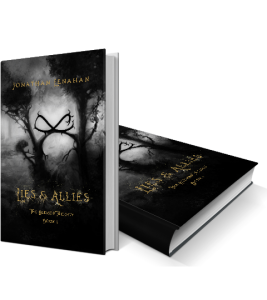 Here’s a look at it.
Here’s a look at it.An art print, created to be framed and hung on a wall

And a 13oz coffee mug, bigger than life and twice as sweet.

All of these things you can get from our online store. And, because I love you, most of them are free. For instance, all you’re paying for if you buy the coffee mug, book, and bookmark (package #2, The Jitterbug) is the actual book, plus shipping and handling. Pretty sweet deal, I think.
Take a look at everything. Hopefully you find something up your alley.
Bonus: Free Chapters:
Just for giggles, the first five chapters of Lies and Allies are available for free in PDF format. If you’re unsure whether or not you want to spend the money on me, give those a read first. That link can be found on the home page.
Changes to Lies and Allies:
Lies and Allies is a revamping of Fallen Victors. We’ve already cleared that up. But how, specifically, is it different? Below is a conveniently bulleted list of differences between the two books. They are, in a word, significant.
Fallen Victors was 89,000 words (ish). Lies and Allies is a little over 110,000 words (again, ish). So right there, you have a 21,000 word increase, which is something like 24% or thereabout. Basically, you get lengthier chapters along with additional, never-before-read chapters.
Lies and Allies is heavily copyedited. If you read a few of the reviews for Fallen Victors on Amazon, you’ll note one or two mentioning grammatical/metaphorical errors. They were right. To address that, I hired a great copyeditor to go through Lies and Allies, the old chapters and the new, so there is no more of that distracting nonsense.
New cover. This may seem obvious, but the cover of Lies and Allies is completely different from its predecessor. We hired an actual artist to do our book designing rather than a graphic designer, and it resulted in something both unconventional and, I think, rather fetching.
New back cover blurb. This might seem small, but this new one does a better job of capturing the central concept of Lies and Allies while still giving a nod to its character-based origins.
Swag items and loot. We now have a coffee mug, bookmarks, and art prints that were created by our artist. These are all entirely new and original.
More and different people die than the original, although some stay the same, which heavily affects the plots and writings of books two and three.
The Blessed and Cao Fen mythologies are both beefed up, giving you more insights into two of Prolifia’s major organizations/people.
There were a few more changes, but I can’t reveal them without revealing overly much about the book itself.
Those Who Read Fallen Victors:
First of all, thank for still being here. I write because I love it, but what’s a writer without readers? Second of all, I appreciate you buying my first book. The fact that you supported me means the world. And I know it’s frustrating that I’m rereleasing Fallen Victors as another book. I get it. You were expecting and waiting for Book Two.
However, as I described in the previous sub-section, Lies and Allies is signinficantly different and longer than its predecessor. To really understand the rest of the trilogy, you’ll need to reread it.
At the same time, though, I don’t expect you to buy the book again. Now, if you want to, then yeah! Do it. But I don’t expect it.
So here’s how I’m getting around it. There is an app called Wattpad. Beginning today, I’m going to be posting one chapter a week to Wattpad. By April 1st, the release date of Lies and Allies, I’ll be introducing two chapters a week. If you’re still with me, that means I’m going to have the entirety of Lies and Allies on Wattpad, completely free for your reading.
That’s the best I can do. I hope it’s enough. Again, if you want to buy it, go ahead. I would obviously love that. The cover is different. The interior is different. And there is a ton of loot to go with it, like the art print and the coffee mug. But I don’t expect it. If you’re tight on money but want to read Lies and Allies, download Wattpad and keep up with it there. Free of charge. And thanks for still being here.
Called to Thrall: Book Two of the Blessed Trilogy:
With alllll that out of the way, I suppose you want to know when the second book will be out. No promises on my end (stuff pops up constantly, almost like a bloody war zone back here), but we’re looking at the end of 2016 or the first few months of 2017 for its release. I’m just finishing up the first draft. No more surprises. At least, none of this degree.
Is that all? Is that it? You’ve probably got enough “me” action from this post, so I promise not to use the first person singular for quite a while.
Did I achieve excellence with Lies and Allies? Meh. That’s not my decision. But did I strive for excellence? Without a doubt. And I’m going into this genre with my head held high. I want you to buy my book, but more so, I want you to love it.
If I’ve convinced you through the course of this less-clever-Shakespearian-monologue, here’s the link for the pre-ordering of Lies and Allies. If you read it, drop a review to me on Goodreads or Amazon. If you end up reading both, then let me know how they differed. I love feedback, good or bad.
Jonathan
The post Lies and Allies: Book One of the Blessed Trilogy appeared first on Jonathan Lenahan.
Jonathan Lenahan's Blog
- Jonathan Lenahan's profile
- 23 followers



